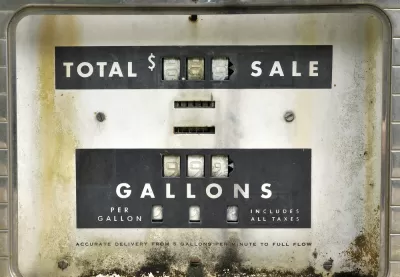President Biden took aim at Russia in his State of the Union address for the war it has started in Ukraine, vowing that they will "pay a price" which so far has yet to extend to their oil and gas exports.

"President Biden vowed on Tuesday to make President Vladimir V. Putin of Russia 'pay a price' for invading Ukraine, seeking to rally the world as Moscow’s forces rained down missiles on Ukrainian cities and prepared to lay siege to the capital of Kyiv," reported Peter Baker, chief White House correspondent for The New York Times, on March 1.
No president had delivered his State of the Union address with such a large-scale and consequential land war underway in Europe since 1945, and Mr. Biden faced the challenge of holding together multinational and bipartisan alliances to counter Mr. Putin.
The previous week, President Biden addressed the nation on February 24 after the Russian invasion had begun. "Today, I’m authorizing additional strong sanctions and new limitations on what can be exported to Russia," he said from the White House. "This is going to impose severe costs on the Russian economy, both immediately and over time."
"I know this is hard and that Americans are already hurting. I will do everything in my power to limit the pain the American people are feeling at the gas pump. This is critical to me."
No doubt that "pain at the pump" was one of the major reasons for not extending sanctions to the energy sector. However, Biden is not alone in keeping Russia's extensive oil and gas exports flowing.
Europe's dependence on Russian gas
"In the hours after the invasion of Ukraine, there were calls for Europe to punish Russia by ending energy purchases," wrote Bloomberg News correspondents Elena Mazneva and Anna Shiryaevskaya on February 24.
But the immediate response of European energy companies was to buy more natural gas, much of it transported through Ukraine’s pipeline network.
Europe’s first war of the 21st century has highlighted its dependence on Russian energy supplies. A third of gas demand is met through pipelines from Siberian gas fields, giving [Russian] state-run Gazprom billions in revenue every year. Cutting off those supplies would cause gas prices to skyrocket and threaten power cuts. Oil and gas were exempted from the package of sanctions announced by the U.S. and European Union on Thursday.
"Europe’s attachment to Russian gas remains a significant liability, playing a role in the apparently joint U.S.-E.U. decision Thursday to hold off from excluding Russia from a global banking network known as SWIFT," reported The Washington Post on February 24. On Saturday, the sanctions extended to cutting off key Russian banks from SWIFT.
Energy exemption
The energy carve-out to protect American motorists from rising gas prices and Europeans from rising heating and power bills is the subject of the source article (listen here) by politics and economics writer Josh Boak for The Associated Press on February 27.
“Energy exports are the whole game,” said Columbia University historian Adam Tooze, an expert on finance and European politics.
Politicians in the United States and Europe chose to “carve out the one sector that might truly be decisive. I don’t think Russia is blind to what is going on and it must indicate to them that the West does not really have the stomach for a painful fight over Ukraine.”
Boak reports that the aforementioned "key Russian banks" that were cut off from SWIFT on February 26 did not include non-U.S. banks that handle Russian energy transactions. The reason for the exemption: the "sanctions are designed to minimize any disruptions to the global energy markets."
We've been here before
Two posts from March 2014 related to the Russian annexation of Crimea:
- Are Environmentalists Digging Their Own Fracking Hole in Opposing Natural Gas Exports? March 24, 2014
- Natural Gas Dependence Hobbles Western Response to Crimean Crisis, March 11, 2014
Other related posts:
- Subways as Shelters, February 27, 2022
- Just What the World Needs: $20 Per Barrel Oil, March 10, 2020
- Pipeline Politics Ruffle NATO Summit, July 15, 2018
- Russia Takes its Own Route to Auto Efficiency (Gazprom promotes natural gas-powered vehicles), April 12, 2013
- Mass Demonstration Opposes St. Petersburg Highrise (Gazprom to build high-rise HQ), March 18, 2007
FULL STORY: Biden’s Russia sanctions may let Moscow profit from oil, gas

Planetizen Federal Action Tracker
A weekly monitor of how Trump’s orders and actions are impacting planners and planning in America.

Chicago’s Ghost Rails
Just beneath the surface of the modern city lie the remnants of its expansive early 20th-century streetcar system.

San Antonio and Austin are Fusing Into one Massive Megaregion
The region spanning the two central Texas cities is growing fast, posing challenges for local infrastructure and water supplies.

Since Zion's Shuttles Went Electric “The Smog is Gone”
Visitors to Zion National Park can enjoy the canyon via the nation’s first fully electric park shuttle system.

Trump Distributing DOT Safety Funds at 1/10 Rate of Biden
Funds for Safe Streets and other transportation safety and equity programs are being held up by administrative reviews and conflicts with the Trump administration’s priorities.

German Cities Subsidize Taxis for Women Amid Wave of Violence
Free or low-cost taxi rides can help women navigate cities more safely, but critics say the programs don't address the root causes of violence against women.
Urban Design for Planners 1: Software Tools
This six-course series explores essential urban design concepts using open source software and equips planners with the tools they need to participate fully in the urban design process.
Planning for Universal Design
Learn the tools for implementing Universal Design in planning regulations.
planning NEXT
Appalachian Highlands Housing Partners
Mpact (founded as Rail~Volution)
City of Camden Redevelopment Agency
City of Astoria
City of Portland
City of Laramie





























